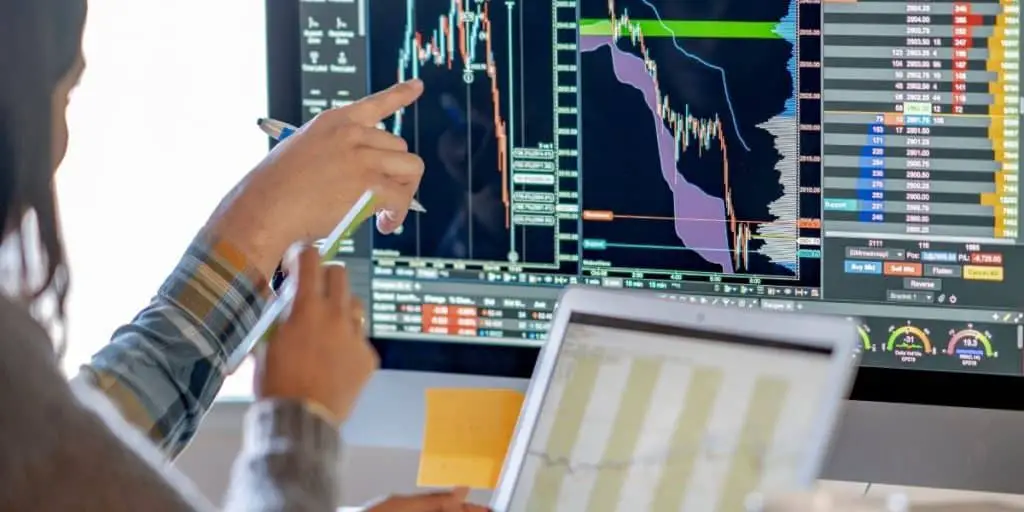From the food in your freezer to the gas in your car, America runs on commodities. Naturally, you might wonder whether or not trading commodities can be lucrative. And even if it is, can you make a promising career out of it?
Commodity trading can be an excellent career for experienced and professional investors. However, it requires a thorough understanding of supply chain dynamics and market patterns to do so successfully. Additionally, commodity price movement is usually more volatile than other securities.
Below, we’ll cover everything you need to know about commodity trading as a career. As you’ll soon find out, commodity trading is a profoundly complex and unique type of investing. I am confident that reading this article will leave you much better prepared to dive into it.
IMPORTANT SIDENOTE: I surveyed 1500+ traders to understand how social trading impacted their trading outcomes. The results shocked my belief system! Read my latest article: ‘Exploring Social Trading: Community, Profit, and Collaboration’ for my in-depth findings through the data collected from this survey!
Table of Contents
Commodity Trading as a Career: What To Consider
While commodity trading ends up being a solid career path for many financial experts and investors, it’s not for everyone.

To help decide if commodity trading is for you, here are some questions to consider:
- What is your risk tolerance? Commodities have a reputation for being extremely volatile. If your risk tolerance is low, the stress will likely turn your hair white.
- What is your experience level? Since commodity trading is often counterintuitive, experience is critical. Plus, you usually can’t trade commodities professionally without some college education or market credentials.
- How well do you understand commodities? Background knowledge of supply chains and niche industries is invaluable in commodity trading. Due to how specialized most commodities are, they’ll behave differently from the rest of the market.
- Are you focused on the short-term or long-term? As far as investments go, most people view commodities as a long-term play. If you’re hoping to find a quick pay-out or aren’t the patient type, these assets might not be for you.
As you can see, commodity trading is best for experienced investors with hardy risk tolerance. Furthermore, it requires patience and experience for the best results.
Is Commodity Trading Profitable?
Since commodity trading generally requires a lot of experience and research, you might assume it’s pretty profitable. But that’s not always the case.
Commodity trading can be profitable. However, the level of profitability is dependent on each investor and their own skills. The more experienced you are, the more likely it is that you will find commodity trading to be profitable.
Let’s break down some of the numbers.
According to Glassdoor and Zippia, commodity traders average salaries around $80,000-$90,000 as of November 2021. Definitely not bad when you stack it up next to some other careers.
Plus, thanks to market chaos brought by COVID-19, commodities trading is more lucrative than ever.
That being said, these numbers are a little misleading. The highest-earning commodity traders can make millions, while the less fortunate ones might not profit at all.
Additionally, most labor statistics don’t differentiate between individual commodity traders and professionals who only invest for clients or funds. So, it’s hard to gauge precisely how reliable commodity trading is as a career.
Pros and Cons of Commodity Trading
To help you figure out if commodity trading is the right choice for you, let’s examine the pros and cons:
Pros
- Protects against inflation. Commodities have a positive correlation with inflation. Since manufacturers and services always need commodities, they maintain value when other asset classes tumble.
- Diversification. Commodities are excellent diversification tools since they typically follow a negative correlation to the rest of the market.
- Tangible assets. The commodities you own are often physical objects, unlike stocks or shares. You can collect your raw resources or materials (such as gold bullion) if you so choose in those circumstances.
Cons
- Requires experience. Commodity trading demands research and expertise. Additionally, you can’t exchange commodities with a firm or for clients without specific qualifications.
- Unpredictable. The price movement of commodities is highly dependent on events like natural disasters and epidemics. As a result, it’s next to impossible to predict how they’ll behave.
- No income generation. While other securities can provide interest and dividends, commodities don’t.
- Counterintuitive price movement. Commodities often have a negative correlation with the rest of the stock market. Meaning that if the market is booming, your commodity value might fall.
For many savvy investors, commodity trading is a fantastic way to make money. Even if you don’t intend to do it full-time, owning some commodities can significantly bolster your portfolio.
That said, it isn’t for everyone. Commodity trading as a career demands expert knowledge of the stock market and steadfast research habits. This is especially true if you intend to work for a firm or handle clients’ investments.
How To Become a Commodity Trader?
So how do you become a commodity trader?
It depends on how exactly you want to make a career out of investing these resources. Are you just trading your own assets, or do you want to take on clients and work for an investment firm?
Let’s start with commodity trading as an individual.
If you just want to invest your own money, it’s pretty straightforward. All you need to do is open an account with any broker or commodity exchange. Then, research and execute trades for commodities or commodity-backed assets.
Voila! You’re now a commodity trader in the simplest sense of the term.
Becoming a commodity trading professional, working with a firm or clients, is more complicated. You’ll need some education and experience to break in.
The vast majority of professional commodity traders have a college education. Usually, this is in the form of a bachelor’s degree in finance or business.
Additionally, many commodity traders possess experience within specific industries or supply chains. This background knowledge can make all the difference in some of the more niche industries.
You can try applying directly to a brokerage or consulting firm that deals with commodities. Alternatively, if you have the dedication, you can find and manage your own client base independently.
How To Trade Commodities?
You can buy stocks, ETFs, and options on most mobile brokerage apps. But what about commodities?
As it turns out, there are a few different ways you can trade commodities. The three primary ones are:
Trading Commodities Directly
You can trade many commodities directly through their respective exchanges. For example, you could buy a gold bar from JM Bullion and hold it on the exchange to sell or have it mailed to you.
While trading commodities directly might seem like the most simple method, that’s not always the case.
There often isn’t a straightforward way to acquire and sell certain resources, like crude oil. Plus, if you buy large amounts of raw materials, you typically have to pay for their storage.
Trading Futures Contracts
Futures contracts are the easiest way for you to get into trading commodities.
Similar to options, these are derivative contracts that obligate the buying or selling of an underlying commodity. You can find them through futures exchanges.
Retail investors typically utilize futures contracts when they want to trade commodities. After all, most people have no use for tons of raw grain bought directly.
Trading Stocks and Options
Another way to trade commodities, albeit indirectly, is through trading shares and options in companies related to specific resources.
For example, you could short BP if you’re bearish on oil in the short term or buy up shares in precious metal ETFs if you’re anticipating some market turmoil.
Most brokers allow the trading of numerous commodity-related companies. So, you may not have to complete any extra steps if you currently invest through a major platform.
Author’s Recommendations: Top Trading and Investment Resources To Consider
Before concluding this article, I wanted to share few trading and investment resources that I have vetted, with the help of 50+ consistently profitable traders, for you. I am confident that you will greatly benefit in your trading journey by considering one or more of these resources.
- Roadmap to Becoming a Consistently Profitable Trader: I surveyed 5000+ traders (and interviewed 50+ profitable traders) to create the best possible step by step trading guide for you. Read my article: ‘7 Proven Steps To Profitable Trading’ to learn about my findings from surveying 5000+ traders, and to learn how these learnings can be leveraged to your advantage.
- Best Broker For Trading Success: I reviewed 15+ brokers and discussed my findings with 50+ consistently profitable traders. Post all that assessment, the best all round broker that our collective minds picked was M1 Finance. If you are looking to open a brokerage account, choose M1 Finance. You just cannot go wrong with it! Click Here To Sign Up for M1 Finance Today!
- Best Trading Courses You Can Take For Free (or at extremely low cost): I reviewed 30+ trading courses to recommend you the best resource, and found Trading Strategies in Emerging Markets Specialization on Coursera to beat every other course on the market. Plus, if you complete this course within 7 days, it will cost you nothing and will be absolutely free! Click Here To Sign Up Today! (If you don’t find this course valuable, you can cancel anytime within the 7 days trial period and pay nothing.)
- Best Passive Investment Platform For Exponential (Potentially) Returns: By enabling passive investments into a Bitcoin ETF, Acorns gives you the best opportunity to make exponential returns on your passive investments. Plus, Acorns is currently offering a $15 bonus for simply singing up to their platform – so that is one opportunity you don’t want to miss! (assuming you are interested in this platform). Click Here To Get $15 Bonus By Signing Up For Acorns Today! (It will take you less than 5 mins to sign up, and it is totally worth it.)

Conclusion
Commodities are an excellent way for any trader to beef up their portfolio. They offer impressive diversification and insulate against the effects of inflation.
However, making a career out of commodity trading isn’t for the faint of heart. You’ll need a hardy risk tolerance, understanding of commodity supply chains, and time to do all the crucial research.
BEFORE YOU GO: Don’t forget to check out my latest article – ‘Exploring Social Trading: Community, Profit, and Collaboration’. I surveyed 1500+ traders to identify the impact social trading can have on your trading performance, and shared all my findings in this article. No matter where you are in your trading journey today, I am confident that you will find this article helpful!
Affiliate Disclosure: We participate in several affiliate programs and may be compensated if you make a purchase using our referral link, at no additional cost to you. You can, however, trust the integrity of our recommendation. Affiliate programs exist even for products that we are not recommending. We only choose to recommend you the products that we actually believe in.
Recent Posts
Exploring Social Trading: Community, Profit, and Collaboration
Have you ever wondered about the potential of social trading? Well, that curiosity led me on a fascinating journey of surveying over 1500 traders. The aim? To understand if being part of a trading...
Ah, wine investment! A tantalizing topic that piques the curiosity of many. A complex, yet alluring world where passions and profits intertwine. But, is it a good idea? In this article, we'll uncork...
